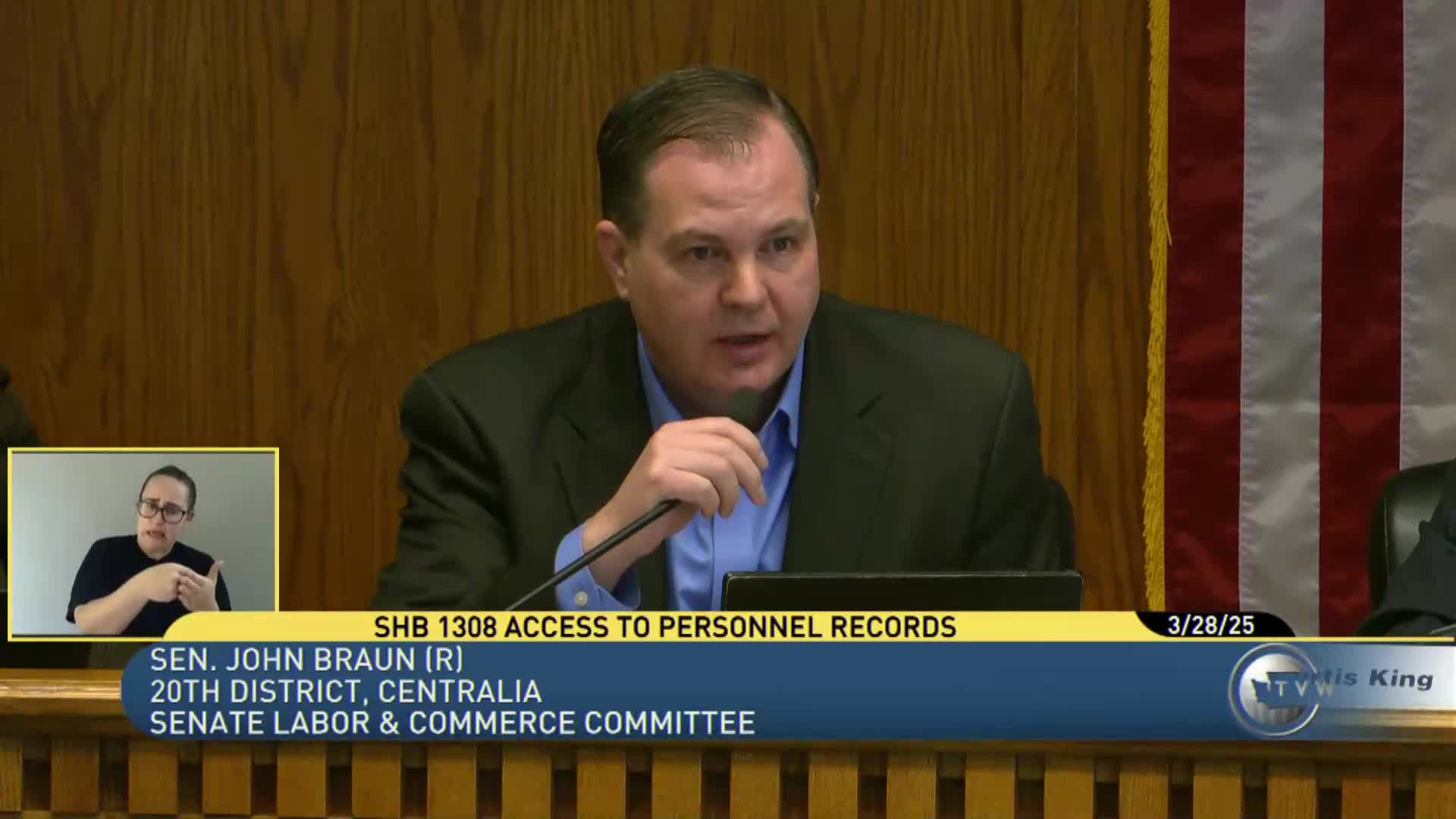Bill would require bargaining when AI changes public employees’ pay or evaluations
March 28, 2025 | Labor & Commerce, Senate, Legislative Sessions, Washington
This article was created by AI summarizing key points discussed. AI makes mistakes, so for full details and context, please refer to the video of the full meeting. Please report any errors so we can fix them. Report an error »

House Bill 1622 would require public employers covered by Washington’s Personnel System Reform Act and the Public Employees Collective Bargaining Act to bargain over decisions to adopt or materially change artificial-intelligence (AI) systems when those decisions affect employee wages or performance evaluations, staff told the Senate Labor & Commerce Committee.
Jarrett Sachs, staff to the committee, told lawmakers the bill keeps statutory definitions of “AI” and “machine learning” and, unlike the Senate companion, excludes certain third‑party updates from bargaining requirements if the update does not meaningfully affect wages or evaluations. Sachs said the Office of Financial Management’s labor relations unit estimated about $1,200,000 in costs tied to implementation, with additional costs expected for higher education and local governments.
The change would limit the long-standing prohibition on bargaining over management rights to permit bargaining only when AI affects mandatory subjects such as compensation or the way employees are evaluated. "We don't want them to be evaluated by AI," sponsor Representative Lisa Parshley said, urging the committee to advance the bill so the Legislature can continue the discussion.
Public witnesses representing labor and public‑sector unions urged lawmakers to approve the change. Sharika Carter, secretary‑treasurer of the Washington State Labor Council, said the bill gives public employees parity with private‑sector workers and “a sense of stability” when technology affects jobs. Katie Durkin of the Washington Federation of State Employees said federal examples show AI can be used to automate employee discipline and termination and argued for guardrails. Christine Reid of IBEW Local 77 warned that customer‑facing utility roles can pose life‑safety implications that automated systems may not adequately address.
The committee paused public testimony to move to caucus and then into executive session; no final committee vote on HB 1622 was recorded in the transcript. Committee leaders said they planned to resume public testimony and further consideration at a later meeting.
Because the bill is narrowly drafted to require bargaining only where wages or evaluations are affected, its supporters said it balances employers’ operational needs with workers’ interests in how new technology is used.
Next steps: Committee staff and the bill sponsors indicated additional public testimony and caucusing would continue the following week; no floor action or committee vote was recorded in the provided transcript.
Jarrett Sachs, staff to the committee, told lawmakers the bill keeps statutory definitions of “AI” and “machine learning” and, unlike the Senate companion, excludes certain third‑party updates from bargaining requirements if the update does not meaningfully affect wages or evaluations. Sachs said the Office of Financial Management’s labor relations unit estimated about $1,200,000 in costs tied to implementation, with additional costs expected for higher education and local governments.
The change would limit the long-standing prohibition on bargaining over management rights to permit bargaining only when AI affects mandatory subjects such as compensation or the way employees are evaluated. "We don't want them to be evaluated by AI," sponsor Representative Lisa Parshley said, urging the committee to advance the bill so the Legislature can continue the discussion.
Public witnesses representing labor and public‑sector unions urged lawmakers to approve the change. Sharika Carter, secretary‑treasurer of the Washington State Labor Council, said the bill gives public employees parity with private‑sector workers and “a sense of stability” when technology affects jobs. Katie Durkin of the Washington Federation of State Employees said federal examples show AI can be used to automate employee discipline and termination and argued for guardrails. Christine Reid of IBEW Local 77 warned that customer‑facing utility roles can pose life‑safety implications that automated systems may not adequately address.
The committee paused public testimony to move to caucus and then into executive session; no final committee vote on HB 1622 was recorded in the transcript. Committee leaders said they planned to resume public testimony and further consideration at a later meeting.
Because the bill is narrowly drafted to require bargaining only where wages or evaluations are affected, its supporters said it balances employers’ operational needs with workers’ interests in how new technology is used.
Next steps: Committee staff and the bill sponsors indicated additional public testimony and caucusing would continue the following week; no floor action or committee vote was recorded in the provided transcript.
View full meeting
This article is based on a recent meeting—watch the full video and explore the complete transcript for deeper insights into the discussion.
View full meeting
